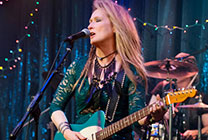|
|
|
|
Ricki and the Flash
|
 |
|
One of the great anthems in popular music is “Rock and
Roll I Gave You the Best Years of My Life”. It was penned by an Australian,
Kevin Johnson, in 1973, and subsequently covered by everyone from Tom Jones to
Gary Glitter. In its complete, unexpurgated version, it’s a downbeat tale of
success that proves ever-elusive: after the various high and lows of a middling
musical career, the narrator has to face the fact that “I’d never be a star”.
There’s a sub-genre of films about rock music that
follow a very similar track. Performers who almost once made it big, or who
never got anywhere near being big; people with a dream of making music who (in
the most extreme cases) come to realize that they could never sing or play very
well, anyhow. These movies are immediately recognizable through their settings
and situations. The fictitious bands created for them trundle through a
procession of very ordinary clubs and bars, hauling their own gear, and often
facing bored, noisy, or sparse audiences. As they pack up later when the joint
is closing, maybe a sole, obsessive, pathetic fan is hanging around to gush
about the “great show” they delivered.
Yet this is not the kind of story where a visionary
but not-yet-celebrated songwriter sings his or her masterpieces to a hostile
world – like the early scenes of the David Bowie-style artist Brian Slade
(played by Jonathan Rhys Meyers), wearing a dress and strumming his acoustic
guitar on stage in Todd Haynes’s Velvet Goldmine (1998).
No, the musical slate of such films is always, in a sense, the same: the bands
play, primarily, cover versions of well-established hits made famous by real
stars.
Ricki and the Flash by Jonathan Demme – who has always had a terrific musical sense,
whether selecting it for his fictions, or recording
its performance (in concerts by Talking Heads, Neil Young, or Robyn Hitchcock)
for documentaries – is the latest entry in this cinematic sub-genre. Diablo
Cody’s script juggles a set of elements familiar from many ‘rock’n’
roll I gave you the best years of my life’ screen laments, such as Paul
Schrader’s Light of Day (1987) and,
supremely, Ulu Grosbard’s Georgia (1995).
The I’ll-never-be-a-star arc of the musical career
story (Meryl Streep as Ricki finds a copy of her one and only album preserved in a box in the basement of
her uptight ex-husband, played by Kevin Kline) is mixed with problems of family
ties and frayed relations – and, since this is a Demme film, flashpoint elements of gender, age, race, and political belief figure in
the collective scrum.
Like seemingly everyone at the microphone in these
movies, Ricki will have a moment where she
spontaneously blurts out all her frustrations and anxieties on stage, using the
performance to act out her problems. Also as usual, even though the venue for
the Flash’s concluding performance is modest and rather fraught with tensions
(a wedding), a string of songs – spanning a cover of Bruce Springsteen’s “My
Love Will Not Let You Down”, and Ricki’s own
composition “Cold One” (actually written by Jenny Lewis and Jonathan Rice) –
manages to rouse and fuse the crowd as surely as Prince’s triple-encore at the
end of Purple Rain (1984).
The watchword in all films of this type is realism –
usually injected through live sound recording (rather than miming) of
performances. (Still, there aren’t many mixing desks in sight up the back of
these supposedly real music venues.) But Ricki and the Flash plays things just a little too safe. One longs for a
single event, character, or mood switch which is truly different or extreme –
like Jennifer Jason Leigh’s agonisingly extended performance of Van Morrison’s
“Take Me Back” in Georgia, or the
near-incestuous current of intense family feeling in Light of Day.
After all, sudden ruptures of tone, violations of
stereotype, and twists of expectation were once what Demme did best, in Citizens Band (1977) or Something Wild (1986). Ricki and the Flash, a modest upswing in the
later years of Demme’s career – because it’s
certainly better than The Truth About Charlie (2002) or Rachel
Getting Married (2008) – is, in the end, itself something of a cover
version.
MORE Demme: The Agronomist, The Manchurian Candidate, Beloved © Adrian Martin September 2015 |
![]()